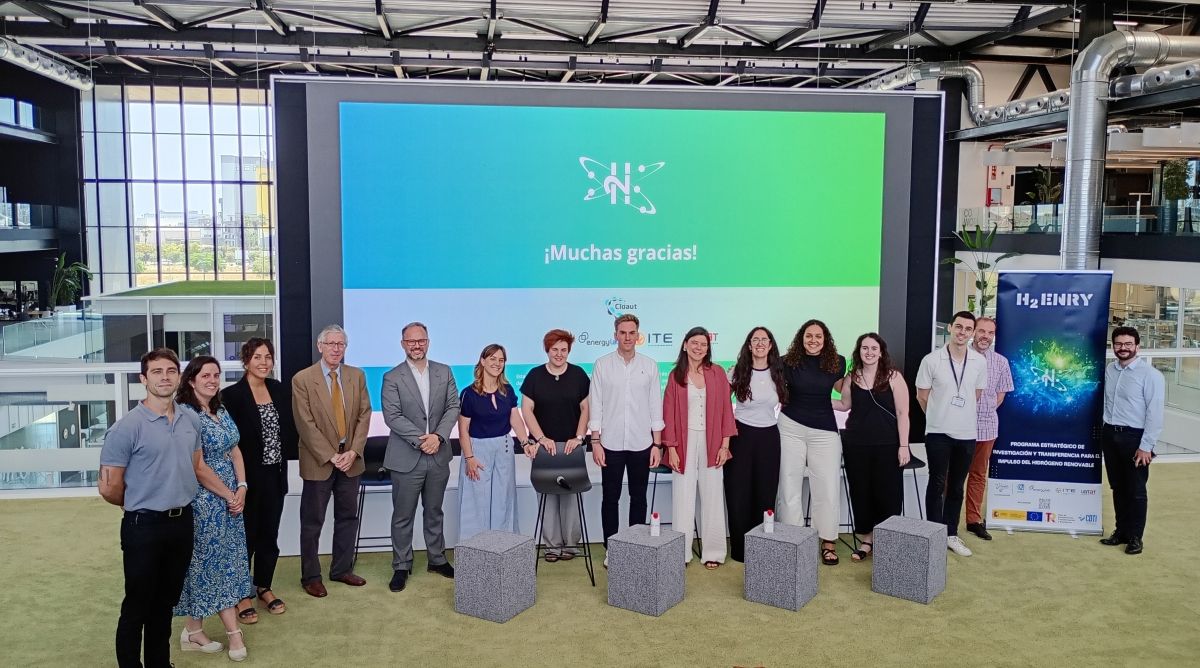On June 16th, the closing event of the CERVERA H2ENRY Network took place in Barcelona, marking the successful completion of a pioneering project aimed at strengthening Spain’s technological capabilities in the field of renewable hydrogen.
Coordinated by CIDAUT, and developed in collaboration with leading Spanish technology centers — AICIA, EnergyLab, ITE, and Leitat — the project has established a national innovation ecosystem focused on accelerating the energy transition through efficient, sustainable, and scalable hydrogen technologies.
Over the past 20 months, H2ENRY has addressed the main technological challenges surrounding the deployment of green hydrogen. One of the most relevant achievements has been the advancement of electrolysis systems, improving performance and efficiency. In parallel, alternative hydrogen production routes such as photoelectrochemical systems (PEC) and Electro-Dark Fermentation (E-FO) have been explored, broadening the technological options to suit diverse sectors and regional contexts.
The project has also made significant progress in the development of advanced materials, particularly PFSA-free membranes and components, which enhance system performance while ensuring higher sustainability and industrial compatibility. These developments are key to reducing production costs and fostering large-scale technological adoption.
Further work has been done on hydrogen storage and distribution, including methanol reforming for on-site hydrogen generation and the optimization of purification processes depending on final use requirements.
One of the flagship outcomes of H2ENRY is the creation of a digital toolbox for electrolyzer simulation and optimization, enabling predictive maintenance, operational efficiency improvements, and data-driven decision-making by simulating various operating scenarios and detecting anomalies in real time.
Beyond technical advancements, H2ENRY has implemented a cross-cutting strategy based on five pillars: training, talent attraction, international positioning, dissemination, and technology transfer. The network has created a tailored training ecosystem aligned with the sector’s needs, offering programs that combine hydrogen production and integration with skills in innovation, digitalization, and project management.
Talent attraction has been a top priority, resulting in the recruitment of 18 new professionals, including international and doctoral profiles. Collaboration agreements with academic institutions and inclusive policies — such as gender equality measures and the integration of people with functional diversity — have further enriched the network.
On the international front, H2ENRY has positioned itself within key hydrogen innovation forums, including EMIRI and the Clean Hydrogen Partnership, with active participation in events like Hydrogen Week in Brussels. In addition, a common roadmap and shared technology watch mechanisms have been established to support future participation in EU-funded R&D projects.
Technology transfer has been another core focus, with outcomes being disseminated to industry through technical workshops, specialized publications, and partnerships with companies, helping bridge the gap between lab-scale research and market-ready solutions.
Although the project formally ends in June 2025, the H2ENRY network will remain active as a stable platform for collaborative innovation and knowledge transfer. With a shared vision and strong commitment to sustainability and industrial competitiveness, the project partners continue working toward a decarbonized and decentralized energy future based on homegrown technologies.
🔗 Learn more at https://h2enry.es
📱 Follow us: LinkedIn | Twitter
Funding Acknowledgment
This project was funded under the 2023 CERVERA programme for Excellence in Technology Centres, part of Spain’s State Plan for Scientific, Technical and Innovation Research 2021–2023, and aligned with the Recovery, Transformation and Resilience Plan — Funded by the European Union – NextGenerationEU.
